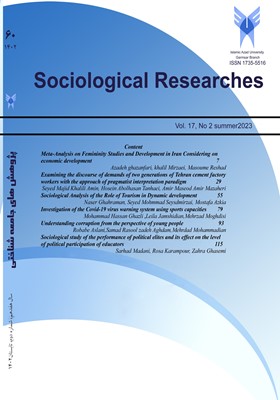Sociological study of the performance of political elites and its effect on the level of political participation of educators (case study: Ardabil province)
Subject Areas :Sarhad Madani 1 , Roza Rosa Karampour 2 , zahra Ghasemi 3
1 - PhD student in Sociology, Central Tehran, Islamic Azad University, Tehran, Iran
2 - Member of the Faculty of Sociology, Central Tehran, Islamic Azad University, Tehran, Iran
3 - Member of the Faculty of Sociology, Central Tehran, Islamic Azad University, Tehran, Iran
Keywords: مشارکت سیاسی, political participation, شفافیت عملکرد, پاسخگویی مسئولان, منافع ملی اعتماد سیاسی, performance transparency, accountability of officials, preference of national interests over individual interests and political trust of educators,
Abstract :
Political participation is a purposeful action to influence the decisions and actions of political elites in the administration of society, which is done by the people. Due to the fact that educators are one of the most influential groups in the process of political participation and consequently effective in the all-round development of the society, therefore, it is very important to know their attitudes, orientations and satisfaction with the performance of political elites. The purpose of this research is to sociologically study the level of political participation of educators, investigate the performance of the ruling political elite and analyze the variables that have been effective on the level of political participation of educators in Ardabil province. The statistical population of the research is 16,300 people of Ardabil Province and its sample size was estimated to be 380 people according to Cochran's formula. In this research, simple and stratified random sampling methods were used. The theoretical framework of the research was adapted from the theories of Huntington, Nelson and Lipsett. Cronbach's alpha test was used for the reliability of the questionnaire and face validity was used for its validity. The current research was conducted using a survey method and its hypotheses were tested using the Pearson correlation coefficient test and to analyze the information and predict the dependent variable from the independent variables of linear regression and to measure the relationships of the variables in a causal model of the method. Statistics based on multivariate regression analysis or path analysis using spss software was used. The results of the research showed that the political participation of the studied educators is at a low level, so that 61.20 percent of the respondents have low political participation. between the variables of transparency of officials' performance (r=0.71) with (sig=0.000), accountability of officials (r=0.65) with (sig=0.000), preference of national interests over individual interests by officials )r=0.64) with (sig=0.000), rulers' fight against corruption (r=0.58) with (sig=0.000), political trust of educators (r=0.53) with (sig =0.000), actions of rulers to improve social services (r = 0.56) with (sig = 0.000) and actions of political elites for political development (r = 0.59) with (sig = 0.000) There is a significant relationship between the political participation of educators and the adjusted coefficient of determination) (can explain 37% of the variance of the political participation of educators.
_||_


